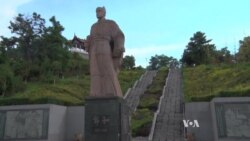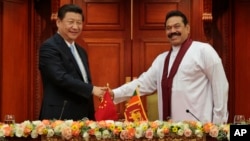Chinese President Xi Jinping’s landmark visit to South Asia last week was an opportunity for China to try to ease tensions with its big neighbor India. It was also a chance to promote what Beijing calls the “Maritime Silk Road.”
Much like Beijing’s efforts to link up with Central Asia, where China is promoting a “New Silk Road” and seeking to expand the flow of Chinese goods and services, the maritime route focuses on China’s trade links at sea.
To help boost the profile of the effort at home and abroad, authorities are invoking the name of one of China’s best-known sailors, a 15th century eunuch named Zheng He.
Zheng He grew up on the shores of Dianchi Lake, which is just about an hour south of modern-day Yunnan province’s capital of Kunming.
It was for his trips overseas, however, that he is best known. His seven voyages took him across South Asia, the Middle East and even to the east coast of Africa. They also put China in a unique global position.
“Each time Zheng He would set sail it was with a fleet of some 200 ships, that was stretched four kilometers in length at sea,” said Xu Keming, curator of the Zheng He memorial in his hometown of Jinning.
Xu said treasure ships were as long as 44 meters and that at the time “it was said that when China dominated the Indian Ocean, no country would dare to encroach on its territory.”
That position of prominence did not last long as China turned inward after Zheng He’s death. Still, modern Chinese leaders such as Deng Xiaoping found meaning in Zheng’s history and a sense of mission. Deng spearheaded China’s economic opening in the 1980s.
“Deng said that in its 2,000 years of history China never opened up to the world like it did during Zheng He’s voyages and that after that, its decline continued through the Ming and Qing dynasties,” Xu said. “Because of that, Deng said China cannot shut itself off from the rest of the world and referred to himself as the second Zheng He."
Since October of last year, when he delivered a speech to Indonesia’s parliament, President Xi Jinping has been promoting the “Maritime Silk Road.” In that address, he mentioned Zheng He and highlighted how the admiral had stopped in Indonesia on all seven of his voyages.
The Silk Road policy emphasizes boosting China’s trade links, but much remains unclear about its broader goals, making some neighbors nervous, especially as Beijing lays claim to nearly all of the South China Sea.
One aim of the Maritime Silk Road strategy was to build on historic trade links and speed up the broader adoption of China’s currency, said Jia Jinjing, an economist at Renmin University’s Chaoyang Institute for Financial Studies.
Jia noted that while Xi was in Sri Lanka, he talked about strengthening financial exchanges.
“While Sri Lanka is not a key player in the global financial system, its location in terms of trade and trends is ideal for financial transactions and services,” Jia said.
China is the world’s second largest economy, but unlike most countries its currency is not openly traded in markets across the globe. Gradually though, China has been opening up the trading of its currency. Earlier this year, France, South Korea and Germany were added to the list of countries where the currency can be traded.
During his visit to Sri Lanka, Xi attended a groundbreaking ceremony for a new $1.4 billion port that is being built there with Chinese funds.
Sri Lankan President Mahinda Rajapaksa gave President Xi a rubbing of a stone slab that documents Zheng He’s travels. The slab, which is called the Galle Trilingual Inscription, was found in the early 1900s and is written in Tamil, Chinese and Persian.










